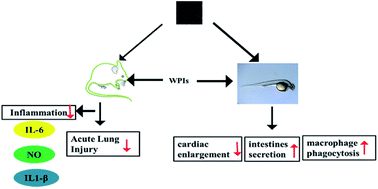Walnut protein isolates attenuate particulate matter-induced lung and cardiac injury in mice and zebra fish
Abstract
Air pollution is an increasingly serious problem, and the fine particles of air pollution can cause diseases of the respiratory, cardiovascular, and immune systems. Walnut protein isolates (WPIs) are peptides purified from walnut protein hydrolysates that have very high antioxidant and 1,1-diphenyl-2-picrylhydrazyl radical 2,2-diphenyl-1-(2,4,6-trinitrophenyl)hydrazyl (DPPH) scavenging activities. In this study, mice and zebra fish were used to test the effect of WPIs on the acute lung injury (ALI) and heart injury induced by particulate matter (PM). The WPIs protected against ALI in the PM-induced ALI mouse model by inhibiting myeloperoxidase (MPO), nitric oxide (NO), interleukin 1β(IL-1β), and interleukin 6(IL-6) in ALI mouse bronchoalveolar lavage fluid (BALF) and pro-inflammatory cytokine production and acyl carrier protein (ACP) level. In the zebra fish model, the WPIs promoted the secretion of PM into the intestinal tract, protected against the heart injury caused by PM, and promoted the phagocytosis of zebra fish macrophages. Therefore, WPIs are potential candidates to be a health-promoting product with no toxicity.



 Please wait while we load your content...
Please wait while we load your content...